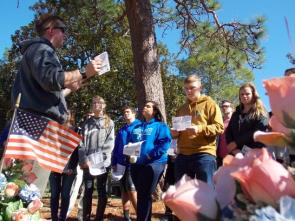Get to Know the 2017 History Teachers of the Year: Blake Busbin, Alabama
Posted by Anna Khomina on Thursday, 08/17/2017
This year, the Gilder Lehrman Institute recognized 52 State History Teachers of the Year for their tireless and innovative efforts to make history come alive for their students.
But who are they, really? We asked these talented teachers to answer a few questions about themselves and to reflect on the challenges and joys of teaching. We will feature one state winner every Tuesday and Thursday between now and September, so keep checking back to learn more about these outstanding educators!
This week, meet Blake Busbin:
Blake Busbin, Auburn High School
2017 Alabama History Teacher of the Year

What is the last great history book you read?
The Legacy of Conquest by Patricia Nelson Limerick is one that truly stands out. It came recommended by a friend who read it for his Gilder Lehrman Teacher Seminar this summer. It stood out to me by challenging the way in which I interpreted the American West while also holding my interest throughout with intriguing stories and keen insights. Her key points have led me to reevaluate how I structure my unit on post-Civil War westward expansion and encouraged me to seek ways in which to truly promote multiple perspectives, beyond just settlers and American Indians, in this unit.
What is your favorite historical site or museum?
We are really fortunate to have the National Infantry Museum (Fort Benning/Columbus, Georgia) close to us. This is an incredible site to study military history as it tells the story of the US Army Infantry within the broader context of America’s rise to  a world power. It puts on display amazing artifacts organized in a way that helps tell this story within its many interpretive exhibits, such as the jungle for the Vietnam War or the trenches in World War I. One of the great parts of this museum is the likelihood of touring it alongside veterans who experienced much of the recent history on display; with this chance, it serves as a prime opportunity to express our gratitude for their service and engage in meaningful conversation about what we see in the museum. This past spring, my students hosted at the museum oral history interviews with Vietnam veterans for the Library of Congress Veterans History Project; it was an incredible learning experience for them to be able to tour the museum with the veterans while also sitting down to help preserve history for future generations.
a world power. It puts on display amazing artifacts organized in a way that helps tell this story within its many interpretive exhibits, such as the jungle for the Vietnam War or the trenches in World War I. One of the great parts of this museum is the likelihood of touring it alongside veterans who experienced much of the recent history on display; with this chance, it serves as a prime opportunity to express our gratitude for their service and engage in meaningful conversation about what we see in the museum. This past spring, my students hosted at the museum oral history interviews with Vietnam veterans for the Library of Congress Veterans History Project; it was an incredible learning experience for them to be able to tour the museum with the veterans while also sitting down to help preserve history for future generations.
What advice would you give to young people, in high school or college, who may be considering a career in education but are unsure?
My best word of advice for those considering secondary education is to think beyond a love of the content. They certainly need a love for the content they may be teaching, but more importantly they must possess a servant’s heart for those placed under their direction. Lesson plans fall apart and often times do not meet the best expectations that a teacher might have for them, but this is often unseen by the students. What is observed is whether or not the teacher values the students in their care. This sense of compassion for the students is the foundation to success in the classroom. A teacher may have a tremendous understanding of what they are teaching along with one of the best lesson plans ever, but without a positive, mutual relationship of respect and admiration between the students and teacher, the lesson will not succeed.
Do you have a favorite historical topic or era?
I have found the Vietnam War, with its many implications both at home and abroad, to be a topic that I can absolutely immerse myself and my students in with great outcomes. Richard Nixon said in 1980 that "no event in American history is more misunderstood than the Vietnam War." I find this quote so true for my students, therefore making it a great topic to teach as it has an eye-opening effect. The history of the Vietnam War contains so many instances of individuals having to make difficult choices full of moral complexity, such as a draftee choosing to accept their draft status or to choose evasion, that it provides valuable discussions for class. With all of the recent attention being given to the era—Ken Burns’s upcoming documentary, the New York Times’s recent ’67 series, and the upcoming 50th anniversary—the new scholarship being produced has brought a new level of depth to researching the era. The photographs, personal accounts, and music all add an additional layer that makes it so rich to teach.